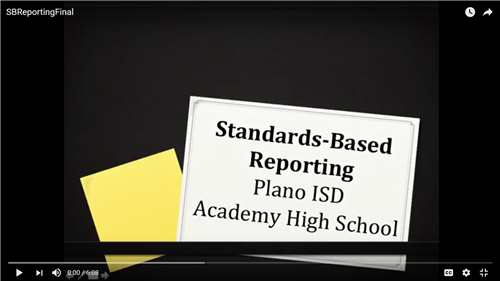- Academy High School
- How We Assess
-
Plano Academy High School Grading Vision
Plano ISD Academy High School was founded on the principles of project-based learning, STEAM, collaboration, and multi-disciplinary learning. The primary goal is to provide authentic learning experiences by asking a relevant current question.
- Authentic learning is a cycle of facilitating learners through the creation of a “need to learn”, helping learners discover and explore information related to the “need to learn” questions,
- Learning evidence is both facilitator-created and learner-created.
- Facilitators use the Texas Essential Knowledge to ensure academic rigor and content focus.
- Each learning experience/process is designed with a learning goal or outcome.
Learning is a process, rather than a destination, and therefore, learners are offered the opportunity to build proficiency, or learn forward, as they experience key concepts within a discipline. Learners are expected to honor due dates and expected outcomes shared by a facilitator.
Facilitators work to intentionally weave themes and concepts within and between projects during a semester and a year, so the learner has multiple opportunities to demonstrate growth in learning around a critical concept in each content area.
How Do Learners Get Grades?
At the end of a semester, grades are reported holistically and in letter form rather than numeric form. Grades available are A+, A, B+, B, C, F.
Demonstration of growth in knowledge and skill is what determines an overall semester score. Facilitators provide proficiency scales with specific and clear language that help learners understand overall learning goals and what needs to be shown.
- Learners are expected to take feedback from an assignment or experience and apply it forward to new assignments as they demonstrate learning within a theme or concept during a semester/year.
- Learners will not necessarily “redo” an assignment to “get a higher grade” because growth in learning is the focus of Academy High School rather than focusing on completion of a specific assignment.
Semester scores are not an average of numerical assignment outcomes, rather a demonstration of a semester of learning. Learning progress can be seen in Empower Learning
Ideally, all feedback from facilitators will be provided within the language of a scale. Learners will be given clear outcomes for academic performance at the beginning of an academic experience. They will have multiple chances to demonstrate learning around a concept.
A semester grade for a learner is a demonstration of multiple data points of learning, and growth in that learning over time. Learners can actively track their progress daily.
-
Standards -based Grading and Research
Guskey, T. R., & Bailey, J. M. (2010). Developing Standards-Based Report Cards. Thousand Oaks, CA: Corwin.
Heflebower, T., Hoegh, J. K., & Warrick, P. (2014). A School Leader's Guide to Standards-Based Grading. Bloomington, IN: Marzano Research.
Vatterott, C. (2015). Rethinking Grading. Alexandria, VA: ASCD.
Mastery-based Report Cards and Grading Practices: Hanover Research



